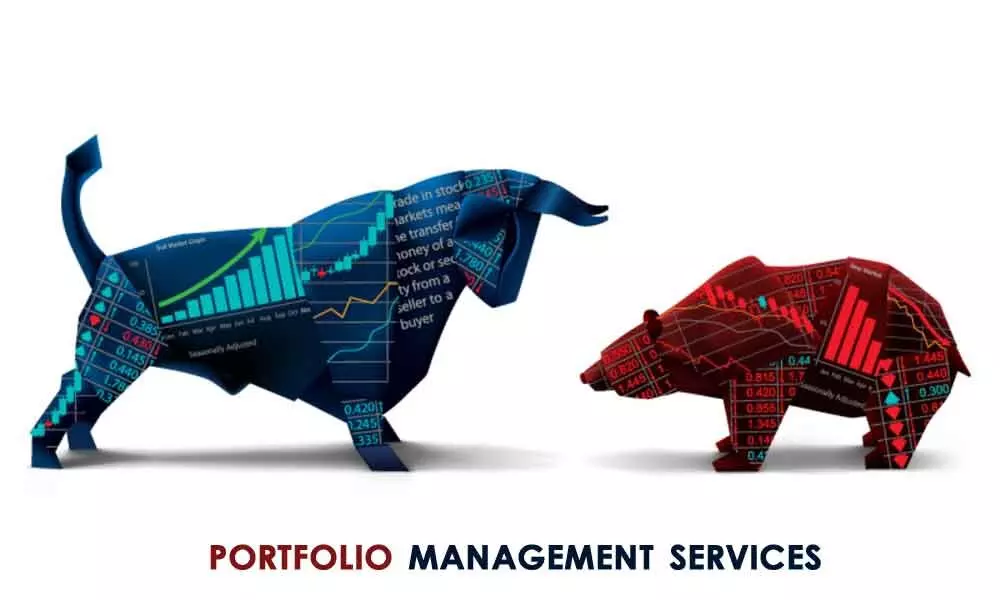Live
- Nikhil, Dhruva & Nikeetaa secure titles in INAC 2024
- Swati Sharma completed 60 parikramas around Shivling to get scene right
- 189 plaints of MCC violations, 23 cases against hate speeches lodged in Karnataka
- Afridi, Chapman rise; Suryakumar remains No.1 T20 batter in latest ICC T20I rankings
- RBI issues red alert on illegal entities in forex market
- Defence Minister Rajnath Singh slams Congress over 'appeasement' politics
- WB moves SC against Calcutta HC order axing 25,753 school jobs
- Time is right for BJP to make an entry into Kerala: Amit Shah
- REC okays Rs 1,869 crore loan for Kiru hydro project in J&K
- Nepal, Qatar agree to increase cooperation in various sectors
Just In
Portfolio management services catching up in India recently


Portfolio management services catching up in India recently
One of the biggest reasons investors look for an advisor is because investors either lack knowledge in investing or don’t have enough time to follow up the investments, and in some cases, both the reasons
One of the biggest reasons investors look for an advisor is because investors either lack knowledge in investing or don't have enough time to follow up the investments, and in some cases, both the reasons. It thus helps investors depend upon an expert.
Especially, for investing in equity, one requires focus or objective/strategy, the tools/discipline to stick to it, a bit of an expertise and dedicated time to do this.
Portfolio Management Service (PMS) is a professional and devoted service that is responsible for making investment decisions on behalf of investors, who opted for them.
Of course, the asset class is not just restricted to equities, but also across the other securities like fixed income, structured products, etc., sticking to the defined investment objective.
The biggest differentiator of these products or services from that of the mutual funds (MF) is that the units are held by the investor not the fund like that of the MF. This makes an investor's portfolio unique and doesn't add to the pool account, though the investment manager or portfolio/fund manager has the right to take investment calls within the purview of the specified fund objective.
These services are broadly defined in three different types, viz., discretionary, non-discretionary and advisory. A discretionary portfolio is where the choice as well as the timing of the investment decisions rest with the fund/portfolio manager.
In the non-discretionary service, the fund manager only suggests the investment ideas, while the choice and timing of the investment rests with investor, though the execution is handled by the fund manager.
However, in an advisory model, the fund manager only suggests the ideas. In India, the most popular and prominent services are of discretionary nature.
Sebi has come up with certain regulatory steps to enhance the experience of the investors and also control the various providers in the market. This brought uniformity in terms of the compliance, reporting and profiling.
These products primarily are targeted for long-term wealth creation with high service levels and greater customization. Unlike the MFs, the investment in an equity PMS has a relatively higher concentrated portfolio in-line with the investment objective to generate higher return.
To minimize wrong selection of investors into these products, Sebi has mandated the minimum ticket size i.e. the investment into a PMS offering at Rs 5 million, with any further contributions in these funds at multiples of Rs5 lakhs.
The major benefits of investing in a PMS offering is the access to a professional management under the aegis of the regulator, continuous monitoring of the portfolio, transparency and customized advice.
The regulator would conduct regular audit and compliance is mandatory making these investments safe though are subject to the market vagaries. The managed portfolios are constantly monitored with desired changes done according to market conditions.
All the PMS providers are subjected to strict guidelines in terms of the communication and reporting by Sebi making them transparent. The providers also enable web-access and/ or app-based tools for the investors to check their latest portfolios with details of various instruments, cash, etc., held in their accounts.
The execution of the PMS investment could be either done entirely through cash infusion or transfer of existing securities of stocks, bonds and/or MFs which could be revamped to suit the fund profile.
The impact of larger risk due to market volatility is still persistent in these products/services. Another risk is due to concentration of portfolio, which is double-edged as it also increases the market risk on the portfolio performance.
Intermittently, the portfolios have drawdowns according to the market conditions and the fund philosophy. In the short run, the timing of the market becomes critical to the performance, though, gets moderated in the long run.
It's thus imperative to find the right strategy that suits the investors' needs and stick to the long term so as to iron out the risks.
(The author is a co-founder of "Wealocity", a wealth management firm and could be reached at knk@wealocity.com)

© 2024 Hyderabad Media House Limited/The Hans India. All rights reserved. Powered by hocalwire.com






